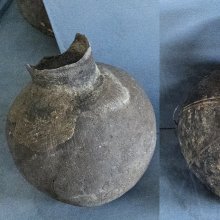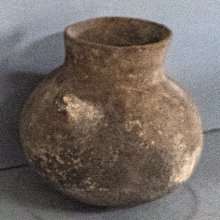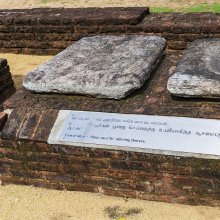Pu, Pū: 17 definitions
Introduction:
Pu means something in Hinduism, Sanskrit, the history of ancient India, Marathi, Jainism, Prakrit, biology, Tamil. If you want to know the exact meaning, history, etymology or English translation of this term then check out the descriptions on this page. Add your comment or reference to a book if you want to contribute to this summary article.
Images (photo gallery)
(+19 more images available)
In Hinduism
Vyakarana (Sanskrit grammar)
Source: Wikisource: A dictionary of Sanskrit grammarPu (पु).—Short term for the labial consonants प्, फ्, ब्, भ् (p, ph, b, bh) and म् (m) as prescribed by P. 1.1.61 e.g. ओः पुयण्ज्यपरे (oḥ puyaṇjyapare) (P. VII. 4.80).

Vyakarana (व्याकरण, vyākaraṇa) refers to Sanskrit grammar and represents one of the six additional sciences (vedanga) to be studied along with the Vedas. Vyakarana concerns itself with the rules of Sanskrit grammar and linguistic analysis in order to establish the correct context of words and sentences.
India history and geography
Source: Cologne Digital Sanskrit Dictionaries: Indian Epigraphical GlossaryPu.—(PJS), abbreviation of putra, ‘a son’ (especially in medieval Jain inscriptions). Note: pu is defined in the “Indian epigraphical glossary” as it can be found on ancient inscriptions commonly written in Sanskrit, Prakrit or Dravidian languages.
--- OR ---
Pu.—ḻugu-kaḍamai (SITI), Tamil; fee for meeting the ex- penses of coating the image of gods with civet; also known as puḻuguvari. Note: pu is defined in the “Indian epigraphical glossary” as it can be found on ancient inscriptions commonly written in Sanskrit, Prakrit or Dravidian languages.

The history of India traces the identification of countries, villages, towns and other regions of India, as well as mythology, zoology, royal dynasties, rulers, tribes, local festivities and traditions and regional languages. Ancient India enjoyed religious freedom and encourages the path of Dharma, a concept common to Buddhism, Hinduism, and Jainism.
Biology (plants and animals)
Source: Wisdom Library: Local Names of Plants and DrugsPu in the Kannada language is the name of a plant identified with Rhododendron arboreum Sm. from the Ericaceae (Blueberry) family. For the possible medicinal usage of pu, you can check this page for potential sources and references, although be aware that any some or none of the side-effects may not be mentioned here, wether they be harmful or beneficial to health.
Source: Google Books: CRC World Dictionary (Regional names)Pu in India is the name of a plant defined with Rhododendron arboreum in various botanical sources. This page contains potential references in Ayurveda, modern medicine, and other folk traditions or local practices.
Example references for further research on medicinal uses or toxicity (see latin names for full list):
· Exotic Botany (1805)
· Species Plantarum (1753)
If you are looking for specific details regarding Pu, for example pregnancy safety, extract dosage, health benefits, chemical composition, side effects, diet and recipes, have a look at these references.

This sections includes definitions from the five kingdoms of living things: Animals, Plants, Fungi, Protists and Monera. It will include both the official binomial nomenclature (scientific names usually in Latin) as well as regional spellings and variants.
Languages of India and abroad
Marathi-English dictionary
Source: DDSA: The Molesworth Marathi and English Dictionarypū (पू).—m (pūya S) Pus, purulent matter. 2 The mucus or gum of the eye. 3 Applied to extremely rotten cloth, wood &c. pū karaṇēṃ g. of o. To spoil or damage exceedingly.
Source: DDSA: The Aryabhusan school dictionary, Marathi-Englishpū (पू).—m Pus, purulent matter. The mucus of the eye. pū karaṇēṃ To damage exceedingly.
Marathi is an Indo-European language having over 70 million native speakers people in (predominantly) Maharashtra India. Marathi, like many other Indo-Aryan languages, evolved from early forms of Prakrit, which itself is a subset of Sanskrit, one of the most ancient languages of the world.
Sanskrit dictionary
Source: DDSA: The practical Sanskrit-English dictionaryPū (पू).—1, 4 Ā., 9 U. (pavate, pūyate, punāti, punīte, pūta; caus. pāvayati; desid. pupūṣati, pipaviṣate)
1) To make pure, cleanse, purify (lit. and fig.); अवश्यपाव्यं पवसे (avaśyapāvyaṃ pavase) Bhaṭṭikāvya 6.64; 3.18; पुण्याश्रमदर्शनेन तावदात्मानं पुनीमहे (puṇyāśramadarśanena tāvadātmānaṃ punīmahe) Ś.1; Manusmṛti 1.15;2. 62; Y.1.58; R.1.53; पवनः पवतामस्मि (pavanaḥ pavatāmasmi) Bhagavadgītā (Bombay) 1.31.
2) To refine.
3) To clean from chaff, winnow; पूत्वा तृण- मिषीकां वा ते लभन्ते न किञ्चन (pūtvā tṛṇa- miṣīkāṃ vā te labhante na kiñcana) Mahābhārata (Bombay) 12.237.4.
4) To expiate, atone for; दुर्मित्रासो हि क्षितयः पवन्ते (durmitrāso hi kṣitayaḥ pavante) Ṛgveda 7.28.4.
5) To discern, discriminate.
6) To think out, devise, invent.
7) To become clear or pure (Ātm.).
--- OR ---
Pū (पू).—a. (At the end of comp.) Purifying, cleansing, refining; as in खलपू (khalapū) &c.
Source: Cologne Digital Sanskrit Dictionaries: Shabda-Sagara Sanskrit-English DictionaryPū (पू).—[(ṅa)pūṅ] r. 1st cl. (pavate)śodhe bhvā0 ā0 saka0 seṭ . (ña)pūñ r. 9th cl. (punātipunīte) 1. To purify, to cleanse, physically or metaphorically. 2. To clean from chaff, to winnow. 3. To Discriminate, to discern. 4. To invent, to think out, to contrive. kryādi0 pvā0 ubha0 saka0 seṭ . r. 4th cl. (pūyate) To grow or become pure. divā0 ātma0 saka0 seṭ .
Source: Cologne Digital Sanskrit Dictionaries: Benfey Sanskrit-English DictionaryPū (पू).—ii. 9, punā, punī, [Parasmaipada.] [Ātmanepada.] i. 1, [Ātmanepada.] ([Parasmaipada.] [Bhagavadgītā, (ed. Schlegel.)] 10, 31); i. 4, [Ātmanepada.], properly Passive. To purify, [Mānavadharmaśāstra] 1, 105; to make pure, 8, 311. Ptcple. of the pf. pass. pūta, 1. Purified, pure. 2. Cleaned. 3. Threshed, winnowed. 4. Foul smelling, stinking (cf. pūti and pūy). n. Truth. Comp. A-, adj. impure. Śastra-, adj. purified by arms, absolved from guilt by dying in the field of battle. [Causal.] pāvaya, To cause to be purified, to purify, [Mānavadharmaśāstra] 3, 183. Ptcple. of the pf. pass. pāvita, Purified, 2, 75.
— With the prep. nis nis, niṣ-pū, To purify, [Bhāgavata-Purāṇa, (ed. Burnouf.)] 6, 1, 18.
— With pari pari, paripūta, 1. Purified completely, [Mṛcchakaṭikā, (ed. Stenzler.)] 159, 2. 2. Threshed (winnowed?), [Mānavadharmaśāstra] 8, 331.
— With vi vi, To purify, Mahābhārata 2, 1150.
— Cf. [Latin] purus, pŭtus, putare (cf. the vedic use of pū), pius, ex-piare, piaculum, punio, poena; [Gothic.] fon (fire, cf. pāvaka), probably for favan; with r for n, [Old High German.] fiur; [Anglo-Saxon.] fyr,
Source: Cologne Digital Sanskrit Dictionaries: Cappeller Sanskrit-English DictionaryPū (पू).—1. punāti punīte pavate (ti), [participle] pūta (q.v.) cleanse, purify, make clear or bright, sift, discern; contrive, invent, compose; [Middle] also clear itself, flow clear; grow or be pure (lit. & [figuratively]). [Causative] pavayati or pāvayati purify.
--- OR ---
Pū (पू).—2. purifying (—°).
--- OR ---
Pū (पू).—3. drinking (—°).
Source: Cologne Digital Sanskrit Dictionaries: Monier-Williams Sanskrit-English Dictionary1) Pu (पु):—mfn. cleaning, purifying (See su-pu).
2) Pū (पू):—1. pū [class] 9. [Ātmanepada] [Parasmaipada] ([Dhātupāṭha xxxi, 12]) punāti, punīte (3. [plural] [Ātmanepada] punate, [Atharva-veda], punate, [Ṛg-veda]; 2. sg. [imperative] [Parasmaipada] punīhi, [Ṛg-veda] etc., punāhi, [Sāma-veda]);—[class] 1. [Ātmanepada] ([xxii 70]) pavate (of [Parasmaipada] only [imperative] -pava, [Ṛg-veda ix, 19, 3], and p. [genitive case] [plural] pavatām, [Bhagavad-gītā x, 31]; p. [Ātmanepada] punāna below, pavamāna See p. 610, col. 3; 1. sg. [Ātmanepada] punīṣe, [Ṛg-veda vii, 85, 1]; [perfect tense] pupuvuh. ve, [Brāhmaṇa]; apupot, [Ṛg-veda iii, 26, 8]; [Aorist] apāviṣuḥ [subjunctive] apaviṣṭa, [Ṛg-veda]; [future] paviṣyati, pavitā [grammar]; [indeclinable participle] pūtvā, [Atharva-veda]; pūtvī, [Ṛg-veda]; pavitvā [grammar]; -pūya and -pāvam, [Brāhmaṇa] etc.; [infinitive mood] pavitum, [Brāhmaṇa]),
2) —to make clean or clear or pure or bright, cleanse, purify, purge, clarify, illustrate, illume (with saktum, ‘to cleanse from chaff, winnow’; with kratum or manīṣām, ‘to enlighten the understanding’; with hiraṇyam, ‘to wash gold’), [Ṛg-veda] etc. etc.;
2) — (met.) to sift, discriminate, discern;
2) —to think of or out, invent, compose (as a hymn), [Ṛg-veda; Atharva-veda];
2) — ([Ātmanepada] pavate) to purify one’s self. be or become clear or bright;
2) — ([especially]) to flow off clearly (said of the Soma), [Ṛg-veda];
2) —to expiate, atone for, [ib. vii, 28, 4];
2) —to pass so as to purify;
2) —to purify in passing or pervading, ventilate, [Ṛg-veda] etc. (cf. √pav) :—[Passive voice] pūyate, to be cleaned or washed or purified;
2) —to be freed or delivered from ([ablative]), [Manu-smṛti; Mahābhārata] etc.:—[Causal] pavayati or pāvayati ([Epic] also te; [Aorist] apīpavat [grammar]; [Passive voice] pāvyate, [Kāvya literature]),
2) —to cleanse, purify, [Taittirīya-saṃhitā; Brāhmaṇa]; etc. :—[Desiderative], pupūṣati, pipaviṣate [grammar]:—[Desiderative] of [Causal] pipāvayiṣati [grammar]
3) cf. [Greek] πῦρ; Umbr. pir; [German] Feuer; [English] fire.
4) 2. pū mfn. cleansing, purifying (ifc.; cf. annauda-, ghṛtaetc.)
5) 3. pū mfn. (√1. pā) drinking (See agre-pū).
Source: Cologne Digital Sanskrit Dictionaries: Yates Sanskrit-English DictionaryPū (पू):—(ga, ña) punāti nīte 9. c. To purify. (ṅa) pavate 1. d. (ya) pūyate 4. d. To be pure or clean.
Source: DDSA: Paia-sadda-mahannavo; a comprehensive Prakrit Hindi dictionary (S)Pu (पु) in the Sanskrit language is related to the Prakrit word: Ṇavvā.
[Sanskrit to German]
Sanskrit, also spelled संस्कृतम् (saṃskṛtam), is an ancient language of India commonly seen as the grandmother of the Indo-European language family (even English!). Closely allied with Prakrit and Pali, Sanskrit is more exhaustive in both grammar and terms and has the most extensive collection of literature in the world, greatly surpassing its sister-languages Greek and Latin.
Prakrit-English dictionary
Source: DDSA: Paia-sadda-mahannavo; a comprehensive Prakrit Hindi dictionary1) Pu (पु) in the Prakrit language is related to the Sanskrit word: Pur.
2) Pu (पु) also relates to the Sanskrit word: Puṃs.
Prakrit is an ancient language closely associated with both Pali and Sanskrit. Jain literature is often composed in this language or sub-dialects, such as the Agamas and their commentaries which are written in Ardhamagadhi and Maharashtri Prakrit. The earliest extant texts can be dated to as early as the 4th century BCE although core portions might be older.
Kannada-English dictionary
Source: Alar: Kannada-English corpusPū (ಪೂ):—
1) [verb] to putforth a flower or flowers; to flower.
2) [verb] to become expanded; to spread out, unfold, enlarge, etc.
3) [verb] to be elated (from joy).
--- OR ---
Pū (ಪೂ):—
1) [noun] (gen.) a blossom of a plant; a flower.
2) [noun] a lotus flower.
3) [noun] an eye disease in which the crystalline lens or its capsule becomes opaque, causing partial or total blindness; cataract.
4) [noun] (fig.) that which is comfortable.
5) [noun] a picture drawn or painted (as on a paper, canvas, article, etc.).
6) [noun] anything that is soft (like a flower).
Kannada is a Dravidian language (as opposed to the Indo-European language family) mainly spoken in the southwestern region of India.
See also (Relevant definitions)
Starts with (+9329): Acalanatha, Papphusa, Pommu, Poorak-bajet, Poorviy-samskruti, Pu chao loi tha, Pu di ci shuo ma, Pu di wu gong, Pu du tian hu sui, Pu fu da ji, Pu fu huang xi xin, Pu fu jin cai, Pu fun xun zi, Pu gong ying, Pu hala, Pu jing dian di mei, Pu jing rong, Pu kung ying, Pu lan jia long dan, Pu lan zhang ya cai.
Ends with (+3563): Aadumuttadasoppu, Aarathi soppu, Aarathida-thappu, Aati-soppu, Abhinavabharatacampu, Abhinavanarayanacampu, Abhinavaparijatacampu, Abhipu, Abhisampu, Acaikampu, Acaikompu, Acaippu, Acalaripu, Acalkurippu, Acanavetippu, Acappu, Acaryacampu, Acattuccirippu, Accagampu, Accagappu.
Full-text (+1535): Malapu, Puna, Agrepu, Pum, Kashipu, Annapu, Khalapu, Pavamana, Pumyoga, Nishpu, Pipavishu, Utpu, Vipu, Paripavana, Popuva, Puyamana, Pukkaran, Puvulakam, Puccokka, Puntattu.
Relevant text
One of your search terms exceeds the minimun character amount per search term. This amount currently equals 2.
No search results for Pu, Pū, Pū°; (plurals include: Pū°s) in any book or story.





